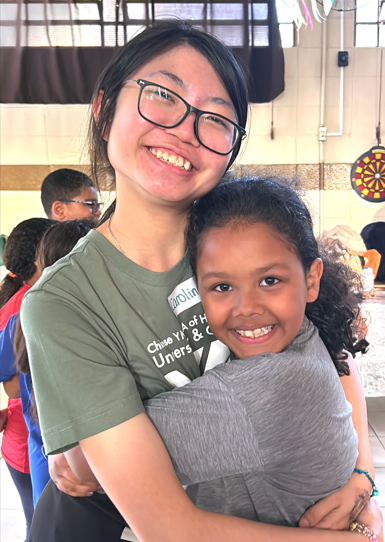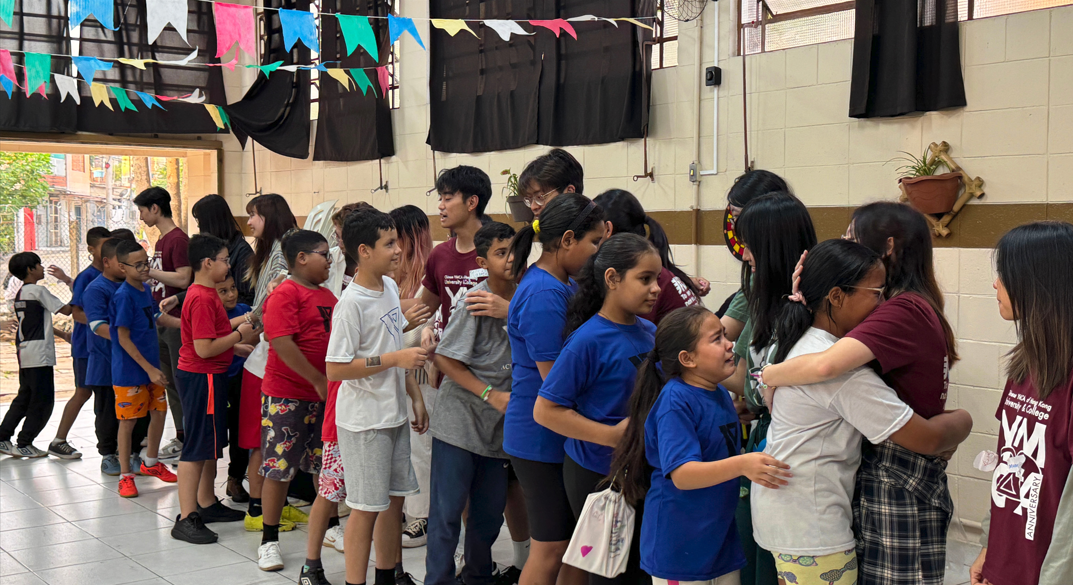
.jpg)
Hong Kong is a rich society where our recognition of poverty is limited to phenomena like homelessness, subdivided flats or caged homes. However, the poverty issues in other countries are often far beyond our comprehension.
This summer, 17 Chung Chi students participated in a 15-day trip, “South America Tour: Exploring Food Crisis and Poverty Issues in Brazil”, co-organised by the College and the University YMCA (Chung Chi College, CUHK). Students delved into the pressing challenges of human development during this half-month journey.
Visiting the Slums
While Brazil is renowned for its soccer superpower, it is equally notorious for its slums. In the study trip, Chung Chi students visited the slums to experience the country’s extreme poverty firsthand. It was hardly imagined by the participants in the past that they would have the opportunity to visit Brazil, and even the slums, during their university years and gain firsthand insights into the hardships that they had previously seen on television only. The students also explored the complex issues of food crisis and poverty from different lenses through community service, field trips, film screenings and questionnaires.
Before we entered the slums, we were repeatedly reminded not to bring valuables and take photos, as there are drug trafficking, sex trade and other illegal activities there. We were divided into three groups, each entered the slum at different time under staff guidance. Walking through narrow alleys, we encountered streets filled with dilapidated brick houses. Many walls showed visible signs of damage, with cracks and erosion making it seem as if the buildings were on the verge of collapse.
We visited three households, where living spaces were larger than subdivided flats in Hong Kong, yet conditions there were dire. The gaps between the walls caused serious leakage when it rained, and the electrical wiring was a dangerous mess. Some households lacked electricity entirely, living everyday life in the dark. Surprisingly, all these dwellings have one common thing. They are filled with all kinds of electrical appliances, such as refrigerators, televisions, washing machines, etc. These appliances are all second- or third-hand donations or were collected from the rubbish dump by the residents. Even though the local government has provided rehabilitation for the impoverished in recent years to alleviate the poverty crisis in the country, the various problems arising from the rehousing have not been effectively solved.

The student became friends with a local kid.
When Seeing Food Crisis
Hong Kong truly lives up to its reputation as a “food paradise”, with a myriad of restaurants offering everything from upscale Western cuisine to delicious street food. In contrast, Brazil, despite being a major food exporter, faces a food crisis. Our research revealed that food security is uneven across Brazil, with coastal cities and remote areas facing particularly significant disparities in food availability.
During the trip, we often saw scrawny street sleepers, struggling to secure three meals a day. Some had to scavenge food in the trash piles. Once we witnessed a person snatch food from a convenience store, highlighting the severe food inequality even in a city like Sao Paulo.

This incident made us reflect on our own eating habits, especially when we often had leftovers. Although many understand the importance of minimising waste, not everyone practices it. Food is not easy to come by, and even more so when it is limited. This trip encouraged us to reject wastefulness and promote food conservation.
Children’s Services
Alongside exploration, we engaged in various children’s services to support the local community. Before the trip, we held preparatory meetings to brainstorm ideas, plan the programmes and prepare the materials. The night before the local programme, we gathered in the hotel lobby for final preparations. We taught the local children traditional handicrafts and dances. With the Olympics approaching, we also introduced local children the emerging sports, giving them a unique sports experience. One memorable service took place in a circus training school where local children eagerly taught us simple gymnastics and juggling. The atmosphere was warm and convivial.
In addition to hosting different activities, we donated toys, food, clothing and stationery to children living in the slums. Witnessing their genuine smiles upon receiving gifts was heartwarming, reinforcing the idea that “it is more blessed to give than to receive.”
Samba Culture
During the 15-day trip, apart from gaining a deeper understanding of local social issues, we also had the opportunity to experience the unique Brazilian traditional culture, especially the vibrant Samba dance and the exciting percussion music. This experience not only enhanced our understanding of Brazil but also allowed us to appreciate the fascination of music and dance.
Samba originated in Bahia, Brazil, from African roots and evolved through the influence of enslaved people, and gradually fused with other local cultures to become one of the most iconic dances in Brazil. One special itinerary was the samba dance class, where the instructor taught us from basic steps to complex spins. Although not all of us were good dancers, everyone was infected by the passion of the Samba and could not help but dance. The scene was full of joy.
In addition to learning the Samba, one of the service sessions during the trip was a traditional dance class with local children. Unlike the Samba, this traditional dance incorporates pounding percussion, with each participant playing a different role. It is only through the collaboration of each other that a beautiful melody can be created. Despite the language barrier, at that moment, it was as if they were suddenly connected, and the music sang the melody of harmony and resonance.
This journey, spanning over 18,000 kilometers, epitomizes the saying, “It’s better to travel ten thousand miles than to read ten thousand books.” Through firsthand experience, we not only gained a deeper understanding of the food crisis and poverty in Brazil but also learned more about the United Nations’ Sustainable Development Goals (SDGs), which help us contribute to the world’s sustainable development. It is believed that this trip is one of the most precious memories of one’s university life.

Students said goodbye to the kids who lived in the favela.
Student Reporters Cheng Tsz Chiu, Chung Cheuk Wang, Lam Chun Kai, Huang Xin Rui, Leung Nga Wing